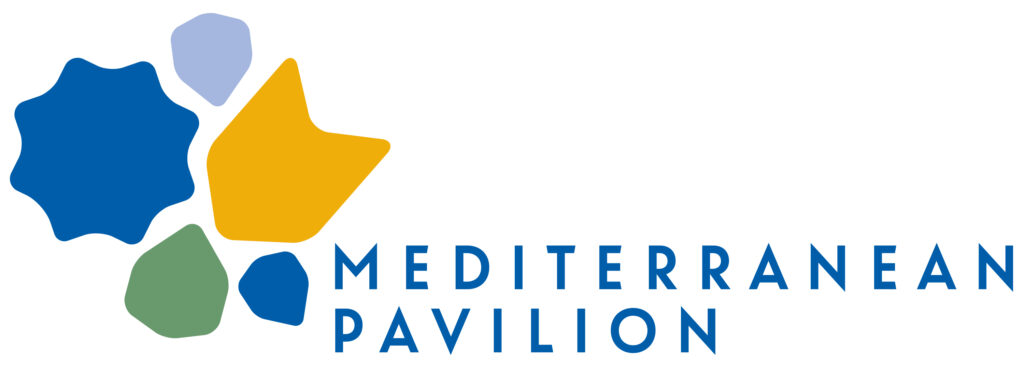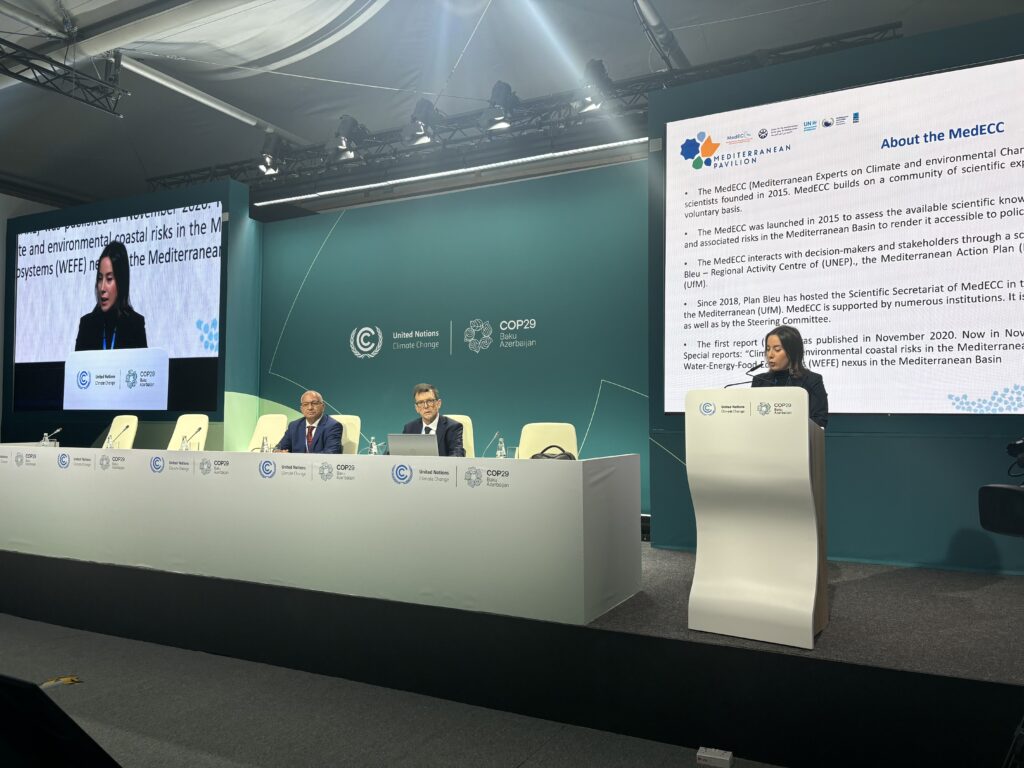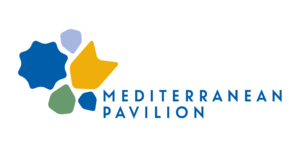MedECC joined Mediterranean Pavilion as scientific council during UNFCCC COP 29, which was held from 11 to 22 November December 2024 in Baku, Azerbaijan. The Pavilion was designed as a gathering space for collaboration, hosting high-profile events, talks, and meetings to address the critical climate risks facing the Mediterranean region and to highlight groundbreaking climate projects developed in the area. The Pavilion was led by the Union for the Mediterranean (UfM), in partnership with the United Nations Environment Programme – Mediterranean Action Plan (UNEP-MAP), the PRIMA Foundation, and a coalition of major climate organisations, and served as a hub for exchanges on effective climate solutions tailored to the Mediterranean region’s needs.

MedECC’s Key Contributions
MedECC participated in several major events that underscored the Mediterranean region’s climate vulnerabilities and emphasized the need for science-based action and informed policy decisions. MedECC contributed significantly through the involvement of its authors, who presented the scientific findings of the three MedECC Special Reports developed on key issues affecting the Mediterranean region on Coastal risks, on Water-Energy-Food-Ecosystems (WEFE) nexus, and on Climate change and human migration. MedECC’s scientific findings are expected to play a key role in informing policy and decision-making, helping to shape effective climate action strategies in the Mediterranean and beyond.
Press conference: Special reports on coastal risks and the WEFE nexus
One of the key highlights at COP 29 was the press conference held on 18 November, to launch the two Special Reports Climate and environmental coastal risks in the Mediterranean and Interlinking climate change with the Water – Energy – Food – Ecosystems (WEFE) nexus in the Mediterranean Basin. The first report addresses the climate and environmental coastal risks to Mediterranean coastal regions’ ecosystem and communities. The second report provides an in-depth analysis of the WEFE nexus where water, energy, food, and ecosystems intersect and emphasiss the importance of integrated resource management to enhance resilience across these sectors. The Summary for Policymakers were presented by. The key findings and results from the two special reports were presented by two of the report coordinators, Piero Lionello and Mohamed Abdel Monem. The session was opened with remarks by Ines Duarte on behalf of Grammenos Mastrojeni, UfM Deputy Secretary General, who reminded the importance of MedECC reports and activities in shaping informed-decisions and policies in the region.
Replay, Press Releases (AR, EN, ES, FR), Key Highlights for the Press (AR, EN, ES, FR, IT)

Side event “Climate, peace, and security nexus in the Mediterranean” – 15 November 2024
Organised by: CIHEAM, ECCO think tank, MedECC
As climate impacts intensify, they increasingly affect peace and stability in the Mediterranean. This side event convenes experts from CIHEAM, ECCO, MedECC, and the UfM to explore the “climate, peace, and security nexus” and its implications for the region. With climate change amplifying pre-existing tensions and potential conflicts, the session will highlight strategies to strengthen resilience and sustainable development in the Mediterranean. During this policy-oriented panel discussion, a diverse panel of experts from national governments, intergovernmental organisations and scientific expert networks will delve into this matter, sharing insights and proposing solutions, including Eda Acara, Project Coordinator and Researcher, Istanbul Policy Center (IPC); Coordinating Lead Author of the MedECC Special Report on Environmental changes, conflicts, and human migration.
Side event “Climate Change and the WEFE Nexus in the Mediterranean” – 19 November 2024
Organised by: MedECC and UfM
This event further focused on the WEFE nexus report, examining how climate change impacts interconnected natural and human systems across the Mediterranean. Moderated by UfM’s Grammenos Mastrojeni, this session will feature experts discussing innovative solutions and approaches for incorporating the WEFE concept into policy-making. Participants will gain insights into sustainable strategies that address the Mediterranean Basin’s unique environmental, economic, and social vulnerabilities.
Speakers
- Moderator: Grammenos Mastrojeni, UfM
- Mohamed ABDEL MONEM: Co-coordinator of the MedECC Special Report on the WEFE nexus
- Michael Scoullos: Chairperson of MIO-ECSDE and GWP-Med
- Assem ABU HATAB: The Nordic Africa Institute, Sweden; Swedish University of Agricultural Sciences, Sweden; Arish University, Egypt / Coordinating Lead Author of the MedECC Special Report on the nexus (onsite)
- Frédéric De Dinechin: Senior Policy Advisor, UfM
Side event “Climate and environmental coastal risks in the Mediterranean” – 21 November 2024
Organised by: MedECC, UfM
The session aims to provide a clear understanding of climate and environmental coastal risks in the Mediterranean region by highlighting the current scientific knowledge and how this science can be leveraged for policy development that prioritise resilience, sustainability, and community well-being. It will discuss adaptation efforts and the need to avoid some of the current measures that may lead to greater challenges in the future by increasing vulnerabilities. The event advocates the need to protect communities, minimise impacts on the natural environment and societies, and address ethical considerations important for socially-oriented adaptation policies.
Keynote presentations:
- Climate and environmental coastal risks in the Mediterranean – Piero LIONELLO, University of Salento, Italy; Co-coordinator of the MedECC Special Report on Coastal Risks, Co-coordinator of MedECC
- Management of coastal risk along the Mediterranean coast, Mohamed BDRABO, University of Alexandria, Egypt, Coordinating Lead Author of the MedECC Special Report on Coastal Risks
- Sustainable development pathways in the Mediterranean, Stefano MONCADA, University of Malta, Malta, Coordinating Lead Author the MedECC Special Report on Coastal Risks
- Insights from the Science-Policy Interfaces: Accelerating Coastal Adaptation and Climate Action – Daria POVH SKUGOR, Director of PAP/RAC, Lead Author of the MedECC Special Report

The Mediterranean region faces an unique set of vulnerabilities due to its geography, climate, and socio-economic structure, especially in relation to coastal risks and the interconnected “water-energy-food-ecosystems” (WEFE) nexus. MedECC’s new reports build on findings from the 2020 Mediterranean Assessment Report, the first scientific report of its kind for the region, to assess more in details these specific riks and adaptations responses. They aim to provide the necessary scientific background for governments, NGOs, and civil society, supporting the development of effective and equitable climate policies in the region.
